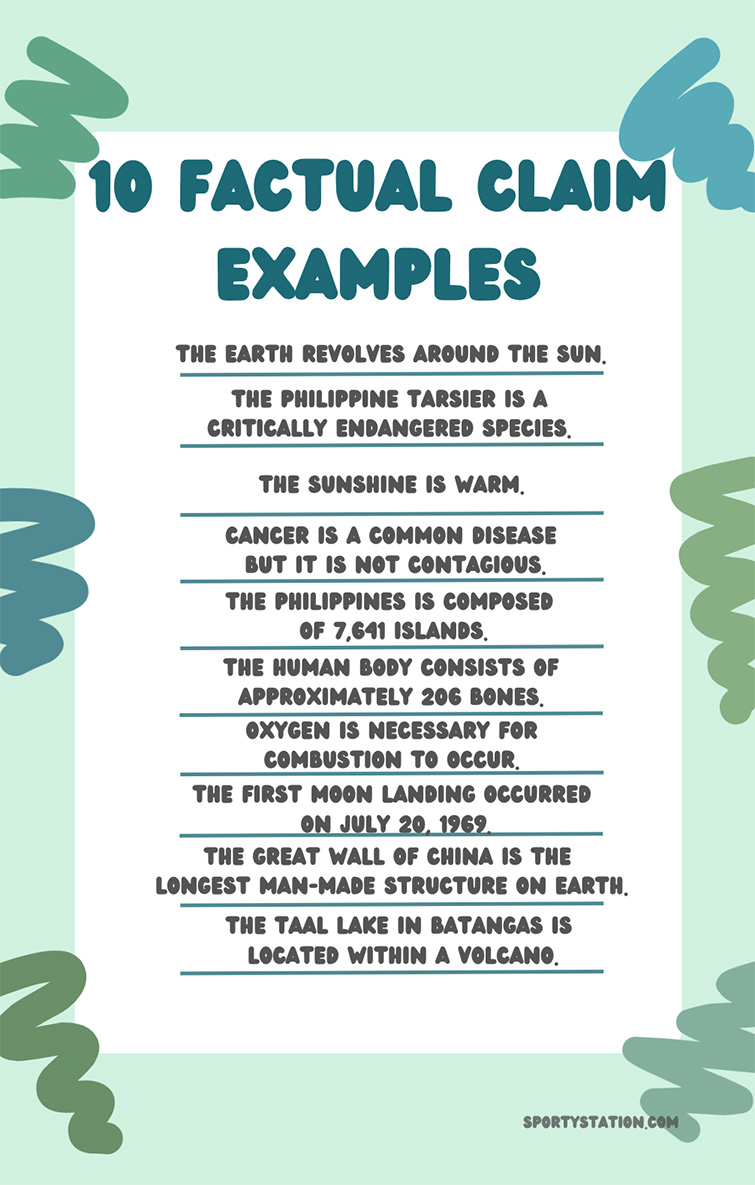Factual Claim Examples & Definition: In English & Tagalog |SHS
Welcome, students! Today we’ll delve into what factual claims are and provide you with practical examples. Get ready to enhance your understanding of factual claims and their role in effective communication. Let’s dive in!
10 Factual Claim Examples
- The Earth revolves around the Sun. (Ang mundo ay umiikot sa paligid ng araw.)
- The Philippine Tarsier is a critically endangered species. (Ang Philippine Tarsier ay nanganganib ng mawala na uri ng hayop.)
- The sunshine is warm. (Ang sinag ng araw ay mainit.)
- Cancer is a common disease but it is not contagious. (Ang cancer ay isang karaniwang sakit ngunit hindi ito nakakahawa.)
- The Philippines is composed of 7,641 islands. (Ang Pilipinas ay binubuo ng 7,641 na mga isla.)
- The human body consists of approximately 206 bones. (Ang katawan ng tao ay binubuo ng humigit-kumulang na 206 na buto.)
- Oxygen is necessary for combustion to occur. (Ang hangin ay kinakailangan para makagawa ng sunog.)
- The first moon landing occurred on July 20, 1969. (Ang unang paglalakbay sa buwan ay nangyari noong Hulyo 20, 1969.)
- The Great Wall of China is the longest man-made structure on Earth. (Ang Great Wall of China ang pinakamahabang istraktura na likha ng tao sa mundo.)
- The Taal Lake in Batangas is located within a volcano. (Ang lawa ng Taal sa Batangas ay matatagpuan sa loob ng isang bulkan.)
If you will notice from our examples above, they are all debatable and yet verifiable. You can use these examples to start a debate.

Definition
A factual claim is a statement that asserts or presents something as true or false, based on objective evidence, facts, data, or observable reality. It focuses on presenting verifiable information that can be proven or disproven through evidence and logical reasoning.
Claims of fact are concerned with describing the current state of affairs, making assertions about events, circumstances, or properties of the world. These claims are not based on personal opinions, beliefs, or preferences, but rather on factual information that can be objectively examined and evaluated.
Things to Remember When Asserting Factual Claims
1. Accuracy
Ensure that the claim is accurate and supported by reliable evidence. Verify the information through credible sources before presenting it as a fact. You need to do extensive fact-checking in order to achieve this.

2. Objectivity
They should be objective and free from personal bias or opinion. Stick to verifiable information and avoid subjective interpretations.
3. Verifiability
Make sure that the claim can be verified through evidence or established facts. It should be possible for others to independently confirm the accuracy of the claim.
4. Evidence-based
Claims of fact should be supported by empirical evidence, data, research, or expert opinions. Include specific references or citations to back up your claim.
5. Clarity
Clearly state the factual claim in a concise and unambiguous manner. Avoid using vague or ambiguous language that could lead to misinterpretation.

6. Relevance
Ensure that the factual claim is relevant to the topic or context in which it is being presented. It should contribute to the overall understanding or discussion.
7. Critical thinking
Apply critical thinking skills when stating factual claims. Evaluate the quality and reliability of the evidence and consider alternative perspectives or counterarguments.
8. Be honest
Present factual claims honestly and with integrity. Avoid misrepresenting or manipulating information to support a particular agenda or bias. Maintain intellectual honesty in your presentation of facts.

Eliza is an educator, blogger, and former university teacher. She also loves to run and has an active lifestyle. She writes about education and her experiences getting into shape, and living a healthy lifestyle.
